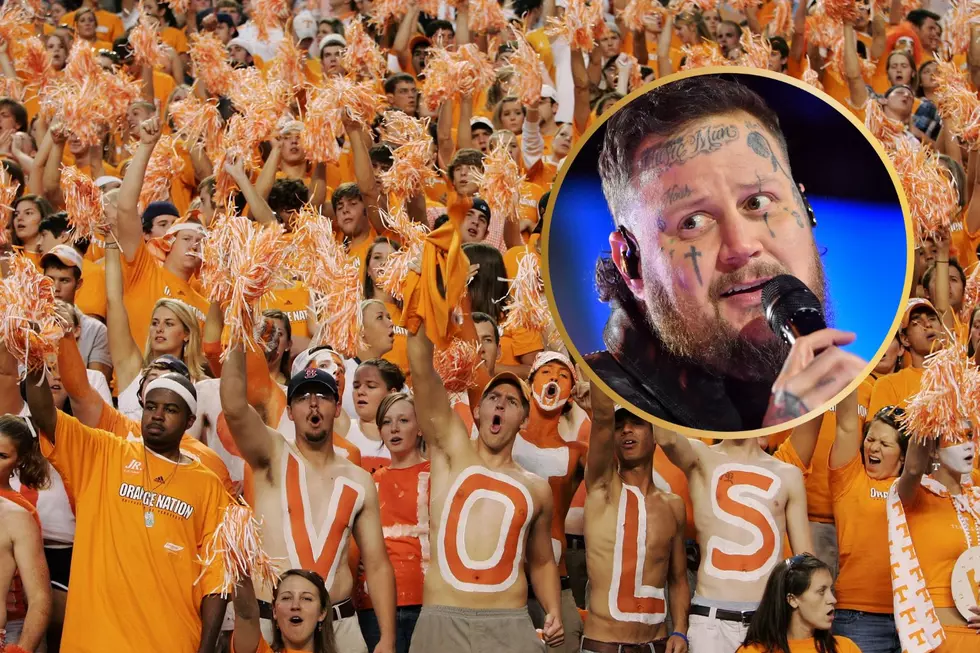Why Are Fans of the Tennessee Volunteers So Offended by Jelly Roll?
In the world of sports fandom, allegiance to a team often extends beyond the game itself, morphing into a way of life for many supporters. Tennessee Volunteers (Vols) fans are no exception. Known for their passionate support of their team and fierce loyalty to their university, the Tennessee fan base is deeply invested in every aspect of their team’s success, from football to basketball, and even to the cultural elements that shape the Volunteer Nation. In recent years, however, a rising conflict has emerged between some Vols fans and a figure outside of the sports realm: Jelly Roll.
Jelly Roll, the Nashville-based rapper and country music artist, has captured national attention with his unique blend of Southern hip-hop and heartfelt country ballads. He’s grown into a cultural phenomenon, with a legion of fans across various genres. However, for a certain faction of Tennessee Volunteers fans, Jelly Roll’s rise to fame has been met with less enthusiasm and, in some cases, outright hostility.
But why are some Tennessee fans so offended by Jelly Roll? What has made this connection between the artist and the university such a point of contention? To answer these questions, we must first dive into the cultural context of both Jelly Roll’s image and the deeply ingrained identity of Tennessee Volunteers fans.
The Rise of Jelly Roll: A Cultural Phenomenon
Jelly Roll, born Jason DeFord, is a music artist who blends multiple genres including hip-hop, rap, and country music. His personal story—marked by struggles with addiction, time in jail, and an eventual return to music—has resonated deeply with his audience. His authenticity, raw lyrics, and open discussions about his troubled past have garnered him a dedicated following. His popularity skyrocketed with the release of his albums A Beautiful Disaster and Ballads of the Broken, as well as chart-topping hits like “Save Me” and “Need a Favor.”
Jelly Roll is celebrated for being unapologetically himself—someone who bridges divides in musical genres while also addressing mental health and personal redemption. His success has allowed him to enter mainstream conversations, and as he has done so, he has become a more visible presence at various cultural and sporting events. His rise to fame has also brought him into the Tennessee Volunteers’ orbit, as he has become closely associated with the university’s football team.
Jelly Roll’s Association with the Tennessee Volunteers
Jelly Roll’s connection to the Tennessee Volunteers began to take shape when he was seen at Neyland Stadium, the home of Tennessee football, attending games and enjoying the atmosphere with his fans. Over time, he grew closer to the Tennessee football program, notably interacting with players, coaches, and even performing at major events related to the team. He was seen cheering on the Vols at multiple games, and his social media posts began to include references to the team and the state of Tennessee.
While some fans saw this as a natural connection between an artist who represents Tennessee in a cultural sense and the state’s beloved football team, others took issue with his behavior and the way in which he positioned himself as a supporter of the Volunteers. This growing presence in the Volunteers’ world, however, did not go over well with all of Tennessee’s fanbase.
Why Are Some Tennessee Fans Offended by Jelly Roll?
Perceived Contradictions Between Image and Values
One of the primary reasons why some Tennessee Volunteers fans are offended by Jelly Roll lies in the perceived clash between his public persona and the traditional values that many fans associate with the University of Tennessee and its football program.
Tennessee football has long prided itself on its history and tradition. The program is built on a foundation of discipline, hard work, and loyalty. The team’s fans, particularly those who grew up in Tennessee, view the Volunteers as a reflection of their personal identity and the values they hold dear—values like respect, pride, and integrity. These ideals are heavily rooted in the culture of college football in the South, and many fans have a very specific vision of what it means to represent the Vols.
Jelly Roll, however, has often been associated with a more rebellious, rough-around-the-edges persona. His music, which often grapples with themes like addiction, crime, and redemption, contrasts with the squeaky-clean image that some fans expect from their team’s supporters. To these fans, Jelly Roll’s past—especially his time spent in and out of prison and his open admissions of drug abuse—seems at odds with the polished, family-friendly atmosphere that some expect at a football game.
Moreover, Jelly Roll’s genre-blending music style—mixing country, rap, and hip-hop—also stirs discomfort for fans who are more entrenched in the traditional Southern culture of country music and the roots of Tennessee’s football program. For some, his embrace of hip-hop culture is seen as jarring in the context of a program that has deep ties to conservative values, including the Southern heritage associated with Tennessee football.
Jelly Roll’s Image as an Outsider
Another reason some Tennessee fans have been offended by Jelly Roll’s association with the team is the perception of him as an outsider. Jelly Roll, while a Tennessee native, does not hail from the same socio-economic background as many of the University of Tennessee’s fanbase. His image as a self-made artist from the streets of Nashville is very different from the often rural, traditional roots of Tennessee’s fanbase, many of whom come from the more conservative areas of the state.
For some fans, Jelly Roll’s rise to fame is seen as a result of a culture that they do not identify with or approve of. His past struggles with the law, his involvement in the more rebellious elements of music culture, and his blunt, unfiltered public persona have left some fans questioning his authenticity as a representative of Tennessee values. His perceived “outsider” status only adds to the frustration felt by certain fans, who may believe that his presence overshadows the genuine Tennessee football culture.
The Role of Celebrity in College Sports
Another dynamic that adds fuel to the fire is the broader issue of celebrity influence in college sports. Over the years, there has been growing concern over the increasing visibility of celebrity figures in the college football scene. While athletes and coaches have always been the focal point, celebrities—especially musicians—have begun to play a more visible role in supporting programs. This dynamic can sometimes create tension among fans who see the attention directed towards celebrities as distracting or undermining the traditional, team-first ethos that college sports are meant to embody.
Jelly Roll’s prominence within the Tennessee football scene is not simply as a fan but as a vocal, visible presence at games and team-related events. His interactions with players and coaches, along with his regular presence in the media, have led some to view him as attempting to hijack the spotlight. Fans who have long been dedicated to the Vols’ team-first mentality see Jelly Roll’s celebrity status as an unwelcome distraction to the game itself. For some, this intrusion of celebrity culture detracts from what should be a focus on the players, coaches, and the sport.
The Backlash: Criticism and Controversy
Despite the growing influence of Jelly Roll within the Volunteers community, his presence has sparked significant backlash. Social media platforms, where many fans express their views, have become battlegrounds for debates over whether Jelly Roll’s association with the Vols is beneficial or damaging to the program’s image. Some fans argue that his authenticity and representation of Tennessee culture are misaligned with what they believe the University of Tennessee should stand for. These fans claim that his past behavior and his unconventional musical style undermine the program’s values of discipline, hard work, and traditional Southern pride.
Furthermore, some Vols supporters feel that Jelly Roll’s alignment with the football program distracts from the hard work of the athletes themselves. Instead of focusing on the players and coaches, some fans view his celebrity status as detracting from the team’s accomplishments. This resentment is especially strong when fans feel that Jelly Roll is being given undue attention—whether through social media interactions, media coverage, or appearances at games—that takes away from the hard work and dedication of the players.
The Positive Side: Bridging Gaps and Bringing Visibility
While there are vocal critics, there are also those who believe that Jelly Roll’s association with the Volunteers has brought attention and visibility to the team in a positive way. His presence has undoubtedly added a layer of star power to the program, particularly in terms of attracting younger, more diverse audiences who may not have previously been engaged with Tennessee football. Additionally, Jelly Roll’s authenticity and rise from adversity resonate with many fans who appreciate his underdog story and the way he represents the state of Tennessee as a whole.
Some argue that Jelly Roll’s rough exterior and unconventional path to fame make him an even more fitting symbol of Tennessee’s blue-collar, hard-working ethos. Instead of seeing him as a distraction, these supporters view him as an example of overcoming personal struggles to achieve success, which mirrors the perseverance and grit they associate with the University of Tennessee’s athletic programs. In their view, Jelly Roll brings a refreshing sense of authenticity to the Volunteers’ brand.



